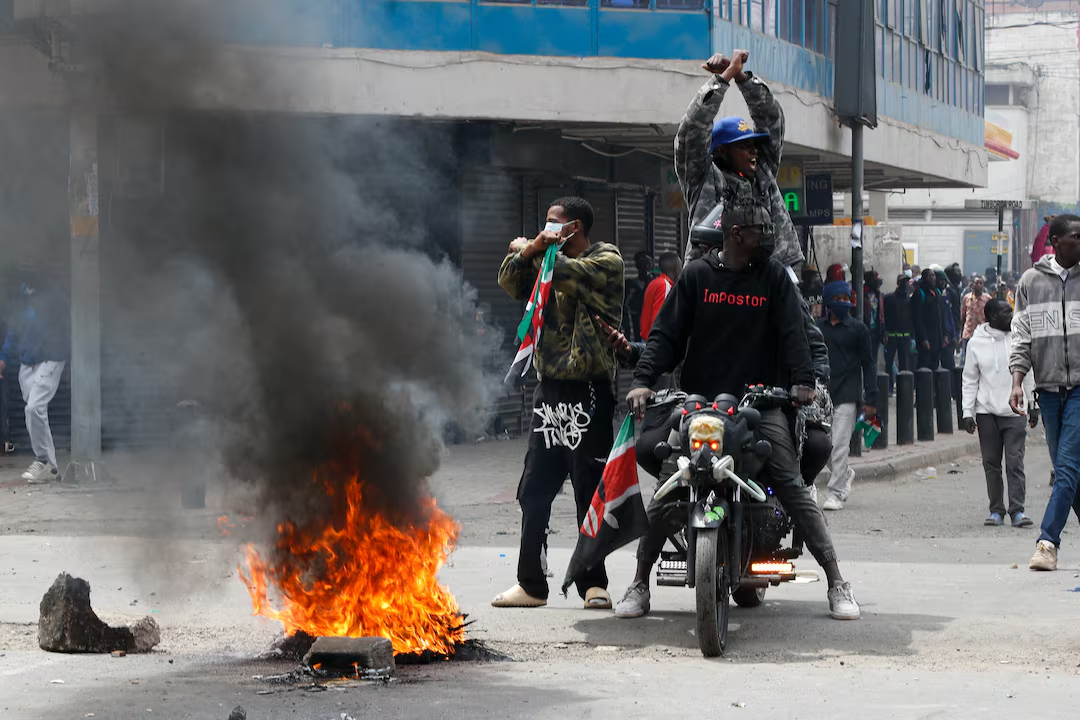Kenyan activist Bill Eugene Omollo was walking home after dark in his Nairobi neighbourhood on June 20 when he spotted trouble – two men eyeing him next to a parked white pick-up without number plates.
The 28-year-old had been involved in the youth-led protests that have upended Kenya since last month and had been released by police only hours earlier following his arrest at one of the demonstrations.
He shouted for help.
“But people were also running. So they took me,” he told Reuters.
Dozens of Kenyans have been targeted in similar abductions in the past two weeks, said human rights groups, who blame the extrajudicial arrests on Kenya’s intelligence services.
Organised online and leaderless, the protests – initially a call to repeal tax hikes – have developed into a movement that has cut across Kenya’s traditional ethnic divisions, becoming the biggest threat of William Ruto’s two-year-old presidency.
Though Ruto withdrew the tax increases in a victory for the movement, the heavy-handed reaction to the protests – campaign groups have documented hundreds of arrests and at least 39 deaths – has raised fears of rights backsliding.
“The president and I gave a categorical promise to the people of Kenya that the issue was abductions and extrajudicial killings will never happen again,” Deputy President Rigathi Gachagua said in a televised address. “Sadly, this is back.”
Demonstrations on Tuesday were marred by violence and looting.
A police spokesperson did not respond to a request for comment on the abductions. Nor did Noordin Haji, the director of Kenya’s intelligence services.
In an interview on Sunday, Ruto denied police involvement in disappearances but broadly defended the actions of the security forces.
However, Irungu Houghton, executive director of Amnesty International Kenya, told Reuters there were clear cases of abuse.
“People who are considered to be protesters or organisers or even just simply voices of dissent are being plucked from their homes or even as they go to church with their families and locked up,” he said.
BLINDFOLDED AND INTERROGATED
Amnesty, the Kenya National Commission on Human Rights and the Law Society of Kenya all put the number of abductions at more than 30, though they said most were later released.
Faith Odhiambo, the president of Law Society of Kenya, said the interrogations abduction victims have undergone during their ordeals have focused on how the protest movement is financed, how it is organised, and the identity of its leaders.
“It’s a very clear indication that the government is behind this,” she said.
After his aggressors bundled him into their vehicle, Omollo said he was blindfolded and driven to an unknown location where he was brought to a room and ordered to strip to his underwear.
He was forced to sit on the concrete floor, which his captors flooded with freezing water. Then the interrogation and threats to his family began.
“They asked me ‘Who sent you? Who is funding you?’. I told them no one is funding us,” said Omollo, who does not know who abducted him and has not reported the incident to the police.
“I thought I would be a dead man.”
THE MISSING
Houghton said Amnesty had confirmed some instances of torture during the illegal detentions.
Odhiambo of the Law Society of Kenya said that if the goal of the abductions was to intimidate the victims, then it appeared to be succeeding.
“They don’t want to be seen on social media or any forums,” she said. “Fear has been instilled.”
After 24 hours, Omollo’s abductors loaded him back into their vehicle and left him near a police station.
He is among the lucky ones. The rights groups say a handful of abduction victims remain unaccounted for.
Nairobi resident Mutia Paul is still looking for his 17-year-old brother, Tony, who was last seen heading for a protest on June 25.
Paul has searched at police stations and hospitals. He has scoured the morgues for his body. He now believes Tony is being detained.
“My heart is full of sorrow, I have done all I can,” he said.
Activists have vowed to keep up pressure on Ruto and lawmakers. But Omollo told Reuters he has had enough of protesting.
Worried that he was being followed and could be abducted again, he has left Nairobi.
“I miss my home, I miss my brothers, I miss my sisters and I miss my community,” he said. “I feel like a refugee in my own country.”
